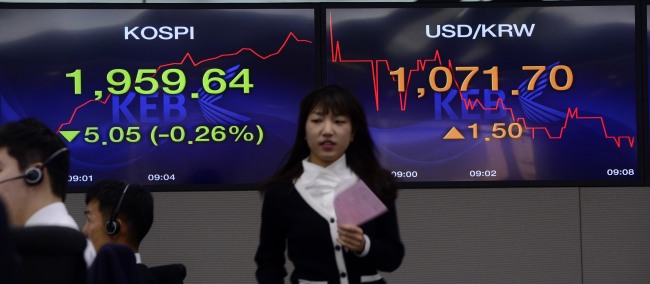South Korea’s financial markets are expected to face an increase in volatility and capital outflows as tensions between the West and Russia over Ukraine escalate and geopolitical risks concerning North Korea grow, analysts said.
Potential military confrontations in Ukraine have undermined investor sentiment and rattled global stocks and currencies, and spiked oil prices over the last couple of days, despite Ukraine accounting for less than 1 percent of the global economy.
The benchmark KOSPI closed at 1,954.11 on Tuesday, down 0.54 percent, following an overnight loss on Wall Street, where the Dow Jones Industrial Average dropped 0.94 percent to 16,168.03.
The won-dollar exchange rose 3.3 won to 1,073.5 won as demand for the U.S. dollar increased.
 |
Electronic boards show Seoul stock prices Tuesday morning amid global financial jitters from growing tensions over Ukraine. South Korean stocks closed 0.54 percent down. (Park Hae-mook/The Korea Herald) |
The political turmoil has made emerging markets more vulnerable as global investors pulled their capital out of the region to reinvest their money in safer assets such as gold, bonds and dollars. The U.S. Fed’s scaling back of its monetary easing had already adversely affected emerging markets.
“The world cannot rule out the possibility of the global financial markets further falling into confusion should (involved parties) fail to immediately resolve the Ukrainian matter,” said Lee Young-won, an analyst at HMC Investment & Securities.
The EU, one of Korea’s largest trading partners, could face an economic setback should the situation intensify as it would disrupt gas supplies via pipelines in Ukraine to Western Europe, while Russia’s economy, which relies on gas exports for growth, would slow down, the analyst said. Such a negative chain reaction would hurt emerging markets and also affect Korea, which largely depends on exports for economic growth.
“Capital outflows from emerging markets seem to have continued as concerns over Ukraine have worsened investor sentiment globally,” Lee Mi-seon, an analyst at Hana Daetoo Securities.
South Korea’s financial policymakers tried to ease concerns and stabilize the markets, saying that Korea was immune to such external factors including North Korea’s short-range missile firing as Asia’s fourth largest economy’s fundamentals remained strong.
In an emergency meeting presided over by Vice Finance Minister Choo Kyung-ho on Tuesday, he said that the possibility of Korea being affected by emerging market volatility was low as its investment and trade with emerging markets were not significant.
By Park Hyong-ki (
hkp@heraldcorp.com)








